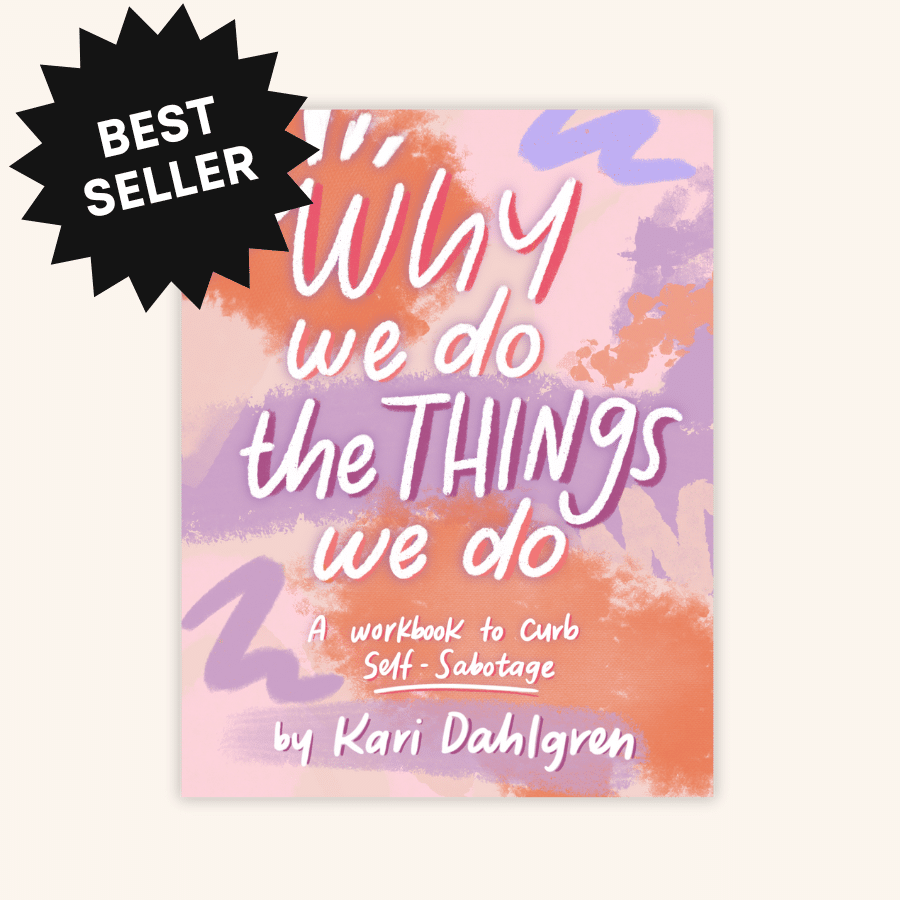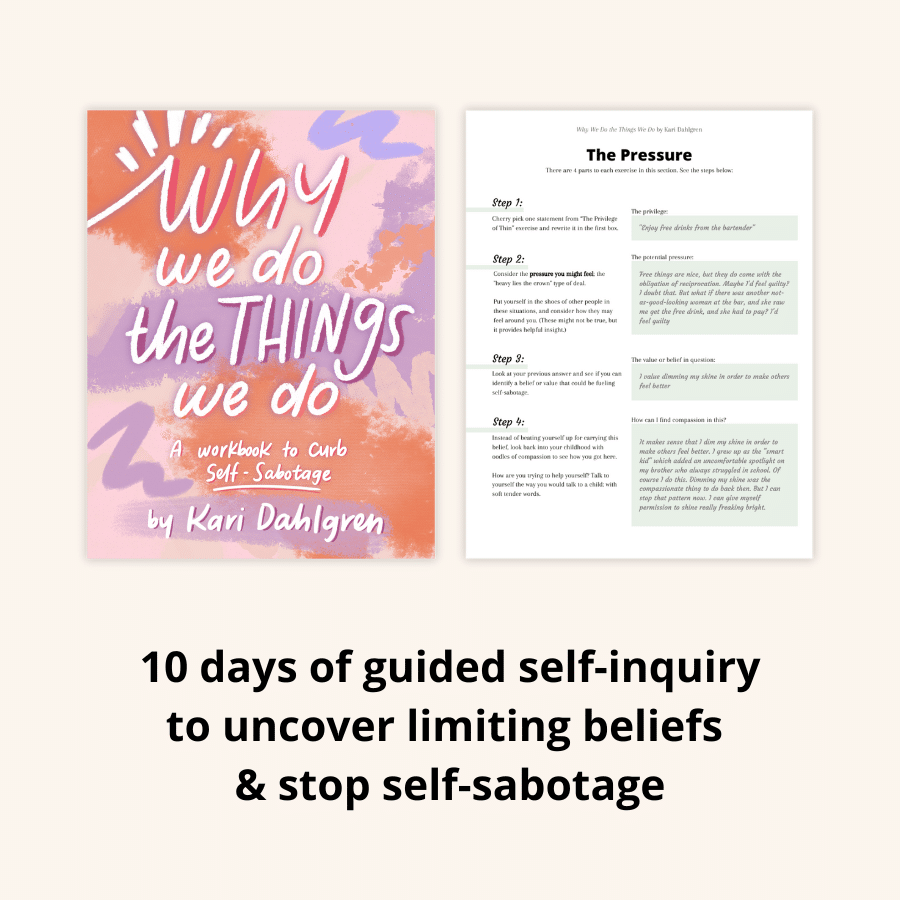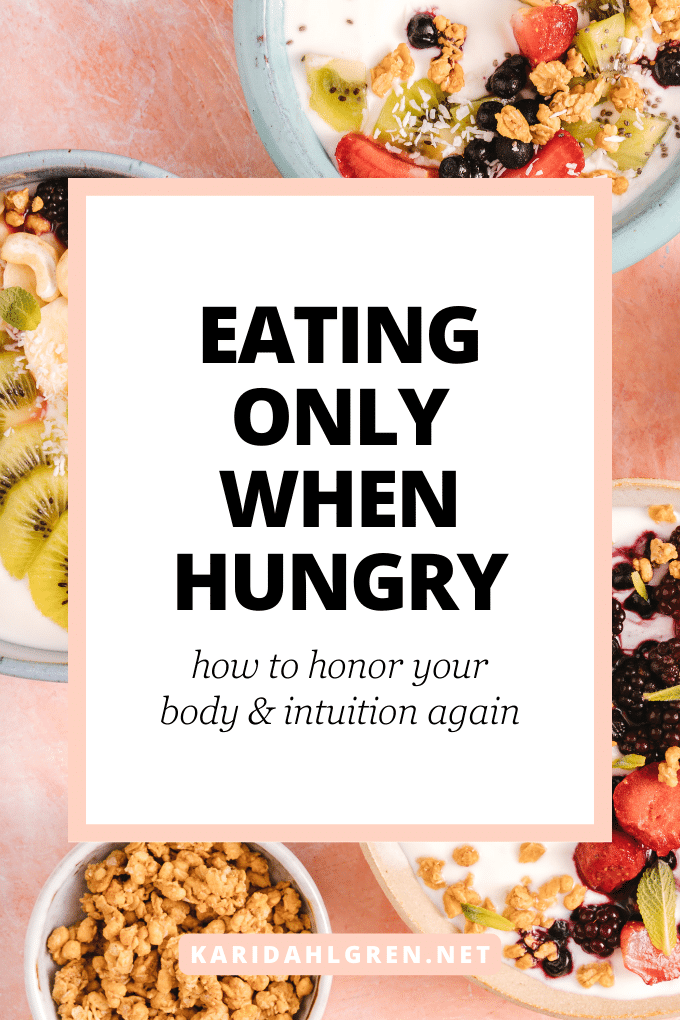
Embarking on the journey of eating only when hungry is not about learning a new skill, but rather about rekindling an innate ability that we’re born with. Observe any small child and you’ll notice their natural proficiency in listening to their hunger cues—they eat when they’re hungry and stop when they’re satisfied, often without any weight issues.
As we grow older, various life experiences can disconnect us from this intuitive way of eating, especially in a culture obsessed with thinness and dieting. The goal of this article is to guide you back to your natural state—where you eat when you’re hungry and stop when you’re full—so you can nourish yourself without any food rules telling you to “eat this, not that.”
In this guide, you’ll discover why so many dieters lose touch with their hunger signals and the barriers standing in the way of an intuitive relationship with food. Then, I’ll share some of my best tips for learning how to listen to your body again and reconnecting to your innate wisdom.
Understanding Hunger
Hunger is the body’s natural signal that it needs energy, which we obtain through the consumption of food and the calories it provides. As you work towards honoring your hunger, it’s important to distinguish between physical and emotional hunger.
Physical hunger is a biological urge that tells you to replenish nutrients. Emotional hunger is driven by feelings like sadness, boredom, or stress. When someone eats due to emotional hunger (emotional eating), food becomes a maladaptive coping mechanism for unwanted emotions.
In the realm of physical hunger, the hormones ghrelin and leptin play key roles in regulating hunger signals. Ghrelin, often called the “hunger hormone,” increases appetite and signals the brain when it’s time to eat. Leptin, on the other hand, is known as one of the “satiety hormones,” and it signals the brain when you’re full.
Restrictive dieting can disrupt this balance. Studies have shown that eating at a caloric deficit reduces leptin levels while increasing ghrelin, physically heightening cravings for high-calorie foods and the sensation of hunger.[1]
This creates a challenging dilemma for dieters: while the body is physically craving more food, the mental discipline of dieting can lead to a disconnection from these hunger signals. Over time, this can diminish your ability to recognize and respond to true hunger cues.
This disconnection from your body’s hunger signals underscores the importance of giving up dieting in favor of listening to your body’s cues instead. With time, eating in response to physical hunger can foster a healthier relationship with food and support long-term well-being.
Is It Bad to Eat Without Hunger?
If your goal is to only eat when hungry, it begs the question: Is it “bad” to eat when not hungry? The simple answer is, no—occasionally eating when you aren’t hungry is a human experience and not inherently bad. We might eat to celebrate a special occasion, enjoy a meal with friends, or comfort ourselves in times of stress.
These actions are part of what makes us human and can bring joy and connection. Try not to let food shaming make you feel bad about your body or eating habits. Eating pleasure has emerged as a catalyst for healthy eating and Canada has even included enjoyment of food as a healthy eating recommendation.[2]
Additionally, there’s the concept of practical hunger, where it’s wise to eat without hunger when you know you’ll be without access to food for long periods of time, such as before back-to-back meetings or classes. Eating preemptively beforehand helps prevent extreme hunger and overeating later on.
As always, it’s important to be mindful of our eating habits. Eating without hunger starts to become a concern when it’s a frequent behavior that leads to negative consequences for our physical or emotional well-being. If you find yourself eating in the absence of hunger regularly, it might be a sign to begin healing your relationship with food and reconnecting to your body’s signals.
The Consequences of Ignoring Hunger
When overeating begins to become an issue, it can cause unwanted consequences if it goes unaddressed. Understanding the repercussions of habitually eating without hunger can help bring awareness to an area of desired behavior change.
Here are some potential consequences of consistently ignoring your hunger cues:
- Disconnection from innate body signals: Excessive dieting and denying your hunger can lead to a disconnection from body signals, making it harder to recognize when you’re truly hungry or full.[3]
- Risk of night eating: Ignoring hunger and undereating during the day can exacerbate night eating problems, as your body tries to make up for the lack of calories.
- Risk of binge eating: When you deny your hunger and undereat, the body employs biological responses to encourage eating, specifically by heightening cravings for high-calorie foods.[4] Research has shown that people with high self-efficacy are even more at risk of binge eating while dieting, illustrating how cognitive restraint is associated with binge eating.[5]
- Risk of overeating: Denying your hunger can trigger general overeating as well.
- Risk of weight gain: If ignoring hunger signals leads to frequent overeating or binge eating, it can lead to weight gain over time.
- Risk of emotional eating: Without clear lines between physical and mental hunger, the risk of emotional eating heightens, as it becomes easier to turn to food for comfort or stress relief, creating a link between trapped emotions and weight gain.
As I mentioned earlier, these consequences are unlikely to happen with occasional overeating, especially moments unmarked by stress or physical and mental distress. However, if you begin to notice these symptoms emerging, it’s important to focus on reconnecting with your hunger signals and listening to your body.
Common Barriers to Eating Only When Hungry
Eating only when hungry sounds straightforward, but various factors can interfere with the ability to listen to your body’s hunger cues. Understanding these barriers is the first step toward a more mindful, intuitive approach to eating.
Here are some barriers to listening to your hunger signals that will be addressed in the next section:
- Uncertainty About What Hunger Feels Like: As previously mentioned, it’s common for people with long histories of dieting to become disconnected with their hunger signals and feel unsure about what hunger feels like.[3]
- Emotional Eating: It’s common to turn to food for comfort, stress relief, or as a reward, rather than in response to physical hunger.[6] This can trigger emotional eating and overeating, which otherwise blunts the feeling of physical hunger.
- Social Eating: Social gatherings often revolve around food, making it easy to eat out of politeness, peer pressure, or simply because others are eating, regardless of our own hunger levels.[7]
- Undereating/Dieting: Restrictive eating patterns can disrupt natural hunger signals, leading to confusion about when to eat. This can result in ignoring hunger cues or overcompensating with excessive eating later on.
It’s also widely believed that thirst can be mistaken for hunger, leading people to eat when they’re actually just thirsty. However, recent clinical studies have largely debunked this myth, suggesting that our bodies are generally good at distinguishing between the two.[8], [9], [10]
While staying hydrated is important for overall health, it’s unlikely to significantly impact our ability to recognize hunger. The key is to focus on understanding and responding to our body’s true hunger signals, rather than relying on external cues or misconceptions.
6 Ways to Honor Your Hunger & Let Your Weight Regulate Itself
Now you have a clear view of why it can be difficult to listen to your hunger—dieting doesn’t exactly encourage us to practice this skill, and habitual overeating can blunt the feeling of physical hunger. To help you overcome this vicious cycle, let’s fill your toolbox with strategies for an intuitive relationship with food—one free of diet rules and guided by intuition instead.
Here are some practical steps for listening to your hunger cues and healing your relationship with food:
1. Pay Attention to Physical Hunger Cues
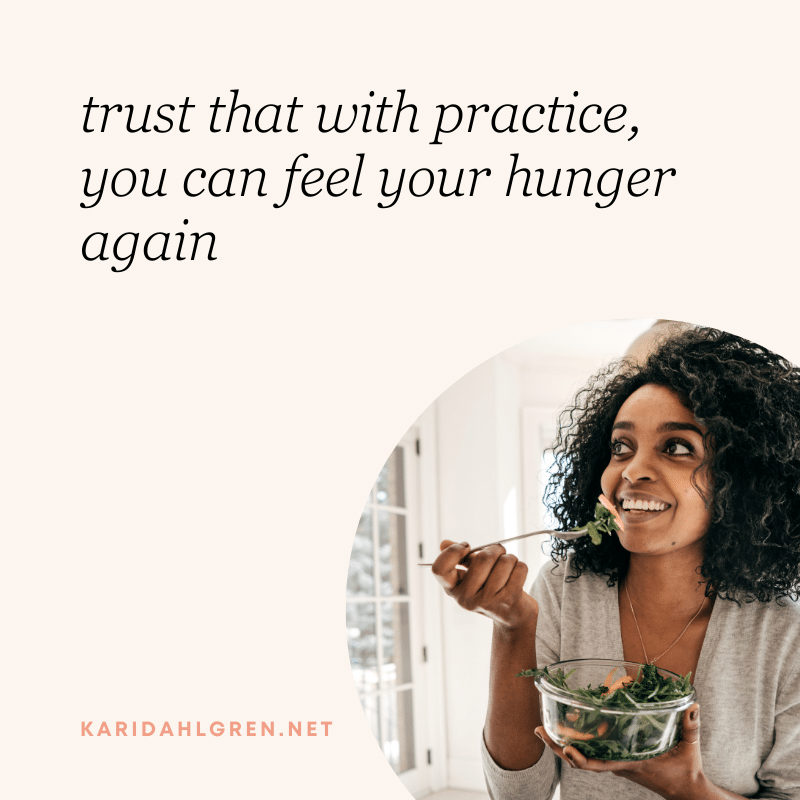
If you have a long history of dieting, it’s normal to feel uncertainty or even confusion around what hunger feels like. Fortunately, just as hunger signals are unlearned through restrictive dieting, you can learn to feel them again by listening to your body.
Practice is key. Even if you can’t feel your hunger right now, the practice of turning inward and trying to listen to your hunger will help you reconnect with those physical sensations over time.
Start by turning inward before each meal to notice any sensations in your body, such as a growling stomach or low energy levels. Even if you can’t hear or feel anything, that’s okay! Over time, you can reconnect with your true hunger signals.
2. Don’t Go Too Long Without Eating, Even If You Don’t Feel Hungry
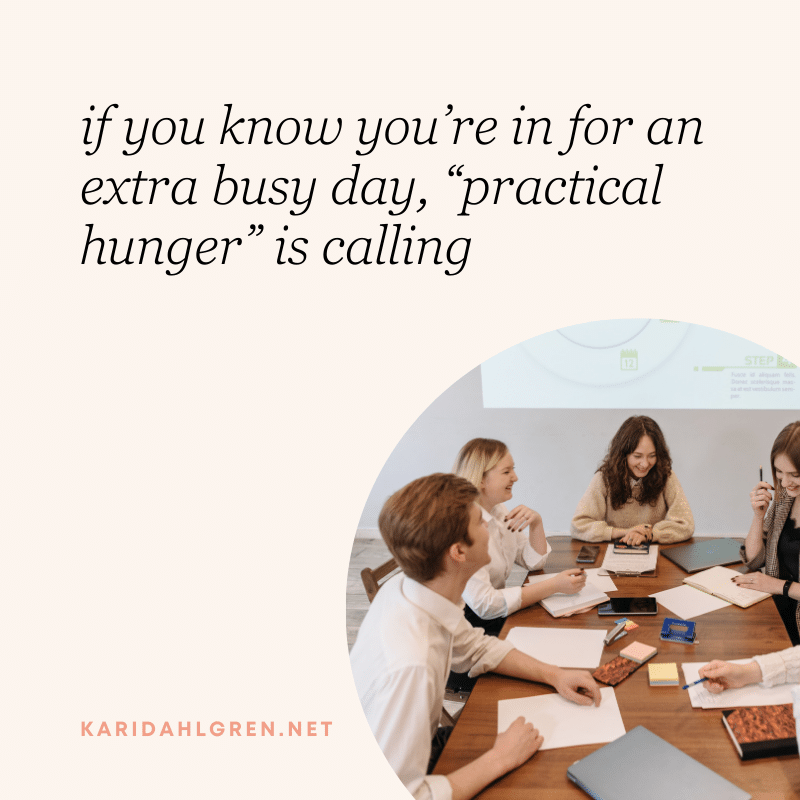
Sometimes, our bodies need fuel even when we don’t feel the typical hunger cues, especially if we’re excessively busy, have a fast metabolism, or still need to work on reconnecting to our hunger signals.
As mentioned earlier, preemptive eating is a self-care habit that can help fuel your body and prevent extreme hunger and overeating later on. If you know that you’re about to go longer than 4-6 hours without any access to food, it would be wise to eat something beforehand.
3. Practice Intuitive Eating
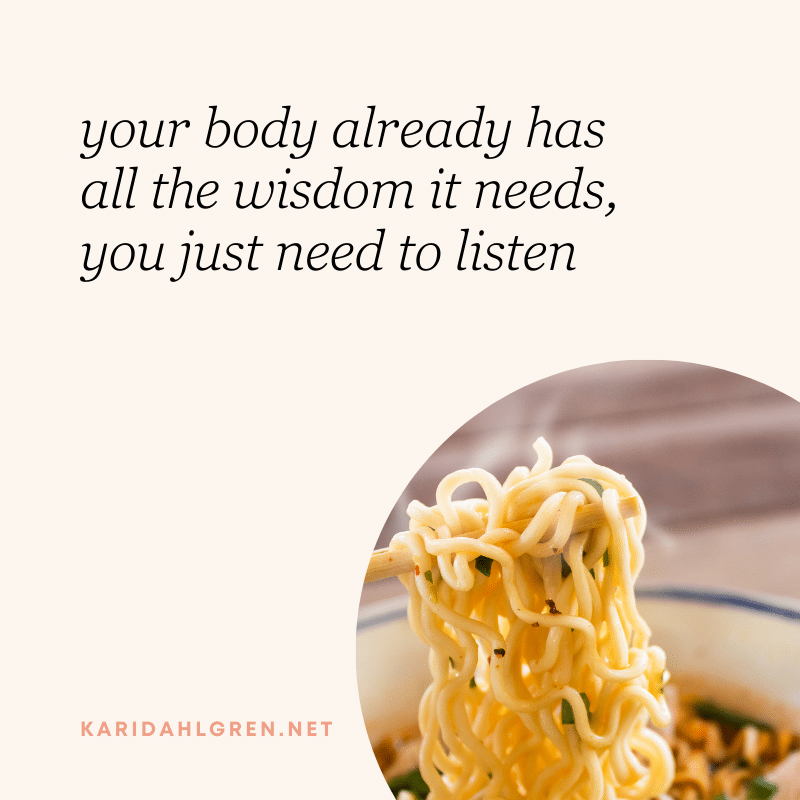
Intuitive eating is a practice that encourages food choices based on internal cues of hunger and fullness, body acceptance, and making behavior choices based on health as well as enjoyment.[11] This approach emphasizes the importance of eating foods that satisfy and nourish your body, encouraging a trusting relationship with your food choices.
It begins with giving up dieting in favor of listening to your body instead. Intuitive eating also invites you to embrace all foods as equal and rest easy knowing that all foods can fit into a balanced diet.
When you’re hungry, it’s best to listen to that cue and eat—particularly the foods that sound good to you. Pleasure and satisfaction are important elements of eating, and without permission to eat the foods you truly enjoy, it can trigger overeating in search of something to ‘hit the spot.’
4. Let Your Weight Regulate Itself
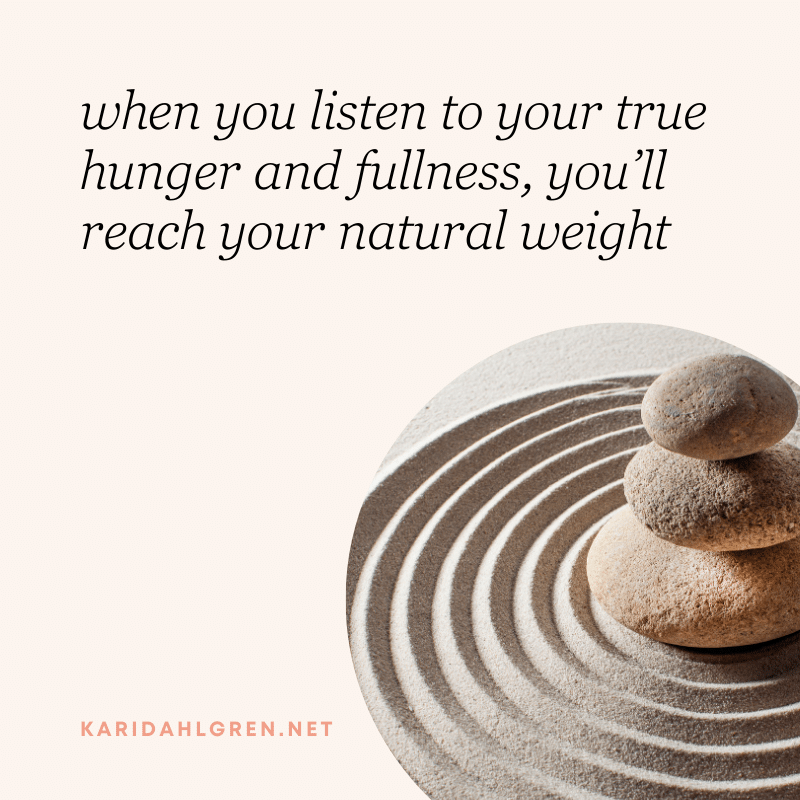
If you’re worried about weight gain with intuitive eating, you aren’t alone. This is a normal anxiety for anyone with a history of dieting.
One body of clinical research that may help quell this anxiety, at least partially, is set point weight theory, which suggest that the body can naturally settle upon a healthy weight when you listen to your body’s hunger and fullness cues.
Although dieting is often an attempt to lose weight, it is associated with an increased set point weight.[12] This implies that by listening to your body’s hunger and fullness signals—eating when you’re hungry and stopping when you’re full—you can help regulate your body weight naturally. Studies have shown that intuitive eaters have a more stable weight than dieters, too.[11], [13]
5. Eat Mindfully As Often As Possible
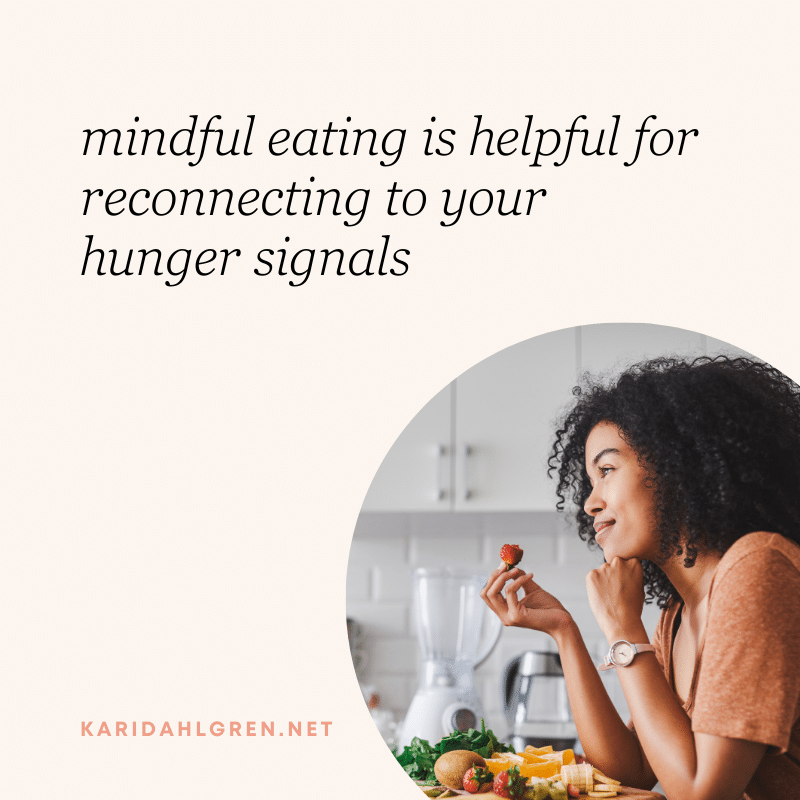
Another great way to get back in touch with your hunger signals and eat only when hungry is to practice mindful eating. This means paying attention to your food and how it makes you feel, savoring each bite and eating without distractions like TV or phones. Mindful eating is a great way to minimize overeating.[14]
Sometimes mindful eating is challenging if you’ve had a tough day and lack the energy to pay attention to your meal. Part of this challenge stems from the fact that mindful eating requires paying attention to your emotions too, which can be overwhelming after a difficult day. I certainly had a hard time with mindful eating at first, so I can relate to anyone that has difficulty putting mindful eating into practice.
With that said, try your best to eat mindfully when you have the mental space for it and practice self-compassion on the days that you don’t. We are all human, and no one can eat every single meal distraction-free, particularly if they are under excessive stress or obligation.
6. Promote Clarity Between Emotional and Physical Hunger with Emotional Skill-Building
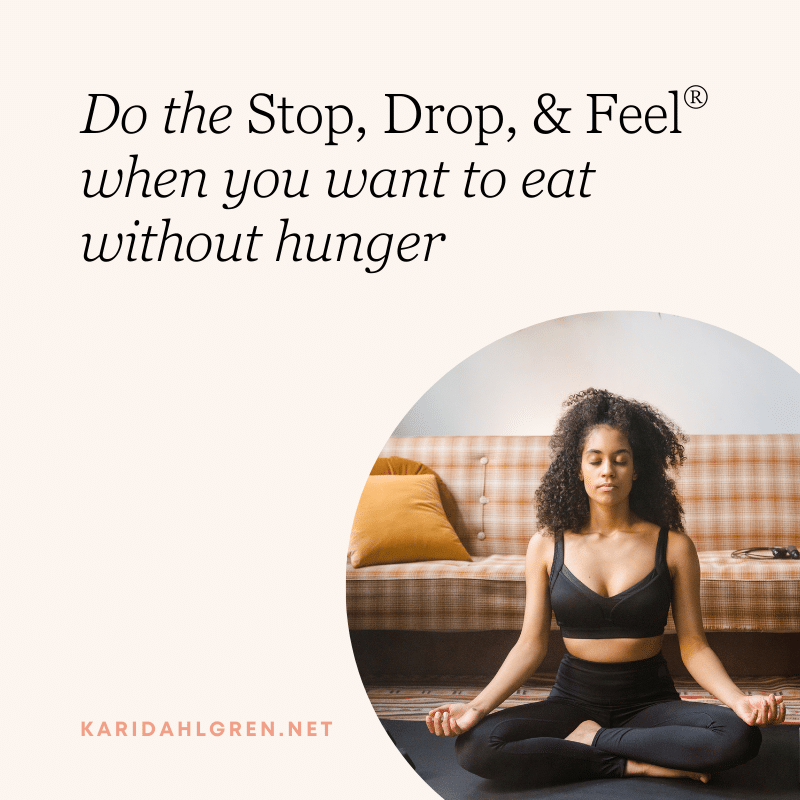
Because emotional hunger can be confused with physical hunger, another great way to get back in touch with your hunger cues is to address emotional eating, too. There are two ways to approach it: coping mechanisms and emotion-regulation skill-building.
On one hand, if food is your coping mechanism, you can try to adopt non-food coping mechanism like talking to a friend, journaling, or engaging in a hobby instead of buffering with food. While this is effective on some occasions, it’s important to acknowledge that they are still coping mechanisms.
For a holistic approach to healing your relationship with food, it’s also important to simultaneously address the underlying issue that creates a need for coping mechanisms to begin with: low distress tolerance, or a low tolerance for emotional discomfort.[15] A great way to increase distress tolerance is to utilize emotion-regulating tools like my Stop, Drop, & Feel® technique, which applies urge surfing to emotional eating.
In the precise moment that you want to eat without hunger, stop what you’re doing, drop into your body, and get curious about how you’re feeling. When you practice sitting still with the uncomfortable emotions that bubble up, your tolerance for discomfort increases over time, which naturally reduces emotional eating. It also reduces emotional hunger, providing more clarity between emotional and physical hunger in the long run.
The Benefits of Eating Only When Hungry
Before we wrap up, I want to highlight the many benefits waiting for you on the other side of dieting. When you practice eating when you’re hungry, stopping when you’re full, and managing your emotions when you want to eat without hunger, you are bound to improve both mental and physical well-being.
Here are some of the benefits of listening to your body instead of food rules:
- Improved physical and mental health: Dieting is strongly associated with stress, anxiety, and depression.[16] Intuitive eating, on the other hand, is associated with better body satisfaction, improve self-esteem, reduced anxiety, and better quality of life—among other benefits![11]
- Ditching diet culture: By focusing on internal body cues instead of external food rules, you move away from diet culture and embrace a more intuitive approach to food, which can be liberating and empowering.
- Inching towards or maintaining your natural weight: Listening to your body’s hunger cues helps you eat in alignment with your needs, which can naturally lead to finding and maintaining a weight that’s right for you.
- Stopping the restrict-binge cycle: Tuning into your hunger signals can help break the cycle of deprivation and overeating, leading to a more balanced relationship with food.
- Enhanced self-trust: Paying attention to hunger cues fosters a deeper understanding and appreciation of your body’s signals, enhancing overall body awareness and trust. While dieting diminishes self-trust, listening to your body helps rebuild that essential foundation.
- Better emotion regulation: By tuning into your emotions in the precise moment that you want to eat without hunger, you can distinguish between physical and emotional hunger and help curb patterns of emotional eating.
- Long-term sustainable eating habits: Focusing on hunger cues promotes a sustainable approach to eating that can be maintained long-term, unlike restrictive diets that are often temporary and unrealistic.
In my program for stopping compulsive eating, Psycho-Spiritual Wellness, there are 3 simple guidelines: eat exactly what appeals to you when you’re hungry, stop when you’re full, and do the Stop, Drop, & Feel® when you want to eat without hunger. Although these guidelines are simple, there’s a lot that goes into it, and I hope this guide helps you put some of these philosophies into action.
Honoring Your Hunger
By tuning into your body’s natural cues, you can break free from the constraints of diet culture and embark on a path of intuitive eating that fosters a healthier relationship with food. Remember that sometimes it’s appropriate to eat without hunger, such as with “practical hunger” and embracing what it means to be human.
I hope that as you begin to tune into your hunger cues and listen to your body instead of food rules, a normal relationship with food can emerge. One free from food anxiety and characterized by freedom, intuition, and self-trust.
If you want to learn more about my personal approach to stopping compulsive eating—which is built on the premise of listening to your body and stopping emotional eating—my free ebook below is a great next step.


